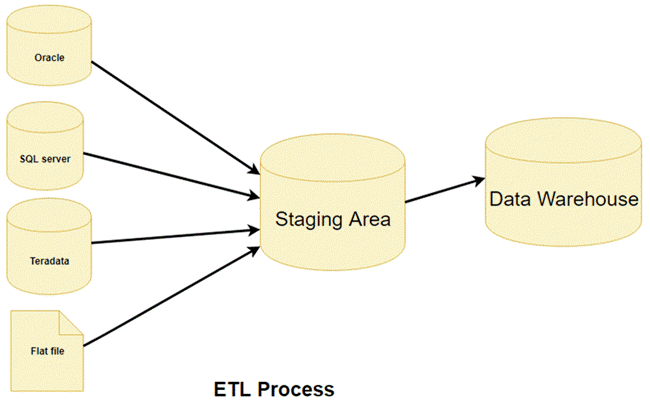ETL Developer Job Description – Roles, Responsibilities, Skills
Who is an ETL Developer?
An ETL developer performs the Extracting, Transforming, and Loading processes. They are involved with extracting business data from a diverse source system and then transforming the data (such as calculations, combining it, applying, and ensuring quality) and loading the transformed data into a data warehouse system in a safe environment.
- Extraction: Extraction implies getting data from the source system and making it readily available (consolidated) in the needed data system.
- Transforming: This step succeeds the extraction stage, which requires appropriately structuring the extracted raw data and then converting it into a quality form.
- Loading: This is the last stage of the ETL process. It is the stage whereby the ETL developer oversees the loading of the transformed data into the required data source, mostly called the data warehouse system.
ETL Developer Skills and Qualifications
An ETL Developer is expected to have a good grasp of data analysis, design and programming skills, especially a broad knowledge of programming languages such as XML, JavaScript, and SQL.
General skills needed to become an ETL developer
- A great organizational ability: This is needed to keep the projects at hand well-arranged and structured.
- A high Problem-solving ability: ETL development comes with several unexpected challenges and problems. An ETL developer must have a thing for propounding solutions to problems on time.
ETL Developer Job Description and Responsibilities
Here are the various roles played by ETL developers:
ETL Process Planning Management: At this stage, the ETL designer/developer is expected to work on the following:
- Give a clear view of the ETL process and determine the data processing boundaries.
- Gather and develop ETL tools and see to their implementation.
- Test run all the needed tools and be sure they work pretty well.
Define business requirements: The business requirement will determine the volume of data extracted from different sources, data models, quality of the data, and as well as figuring out the best storage medium required for the data warehouse needed.
Determine data storage needs: The volume of data handled differs from company to company, so an ETL developer determines the amount of data the company deals with.
Building a data warehouse: Having a strong and secure data warehouse is very important for every business. It is the responsibility of an ETL developer to design a secured data warehouse where data can be efficiently loaded based on the company’s needs and requirements.
Ensure Data Quality: It is very important that data quality is maintained throughout the ETL processes. To achieve this, the ETL developers ensure that everything is put in place at the ETL transformation stage to eliminate errors and fix unstructured and unorganized data extracted from diverse sources at the extraction stage. The ETL developer also ensures that Data is loaded into the warehouse system and meets the business need and standards.
ETL Developer Salary
The average salary of ETL developers is rewarding. The senior position roles for experts and highly experienced ETL developers offer a greater salary than other IT roles.
In the United States, ETL has been considered a much more lucrative role because the computer science field is so massive in the states. The average ETL developer salary in the USA is $114,974 per year or $55.28 per hour. Beginner-level positions start at $99,000 per year, while experienced professionals in this field make up to $306,500 per year.
ETL Learning Material
ETL can be learned on several platforms. While many fancy their chances of enrolling in a physical class, others prefer online training. Different resources and training materials exist, such as the ETL certification course and the ETL testing course videos. ETL can be learned in the following formats.
1) IBM Data Engineering Professional Certificate
This online course helps you to get started in the field of data engineering with a Professional Certificate from IBM. After the end of this ETL course, you will learn skills like designing, deploying, and managing structured and unstructured data, and you will also gain experience with key tools through hands-on projects. This Professional Certificate is for everyone who wants to develop job-ready skills and a portfolio for an entry-level data/ETL engineer position.
Features:
- Taught by top companies and universities.
- You can apply your skills with hands-on projects.
- Learn on your own schedule.
- Course videos and readings.
- Graded quizzes and assignments.
- You will get a shareable Certificate upon completion.
2) Data Warehouse Fundamentals for Beginners
Data Warehouse Fundamentals for Beginners is an online course that helps you to learn the techniques needed to build a data warehouse for your organization. You will learn to apply the key design principles of dimensional data modeling.
You’ll learn how to work with data warehousing architectures and dimensional data structures by learning all the best practices and techniques covered in this online course.
Features:
- 5 hours of on-demand video.
- 1 article.
- Full lifetime access.
- You can access it on mobile and TV.
- Certificate of completion.
ETL Developers Books: This book is curated to guide aspiring Data Warehouse (ETL) developers to get ready experience in building and maintaining data warehouses.
This book is well-detailed, with dimensional modeling tools needed by an ETL developer
Application of ETL
There are several reasons for the use of ETL in business, it includes:
- It supports data transformation verification as well as the required calculations, rules, and procedures.
- A well-built and organized ETL system is important to the execution of any data warehouse project.
- ETL process presents a platform to compare and analyze data using the source and target warehouse.
- The adoption of ETL helps to carry out complex transformations and requires a storage data medium.
- With ETL, it is possible to move data into a data warehouse and then transform and convert it to diverse formats using the same system.
Conclusion
- ETL development refers to all processes migrating data from a multiple source system into a safe warehouse.
- The full form of ETL developer is (Extracting, Transforming, and Loading processes) Developer.
- An ETL developer is responsible for determining the storage needs of a business and the volume of data involved.
- The job description of ETL developers suggests that they are responsible for data flow validation, creating and building a secured database warehouse that meets a given company’s needs and standards.
- An ETL developer must be to load data and be proficient in valuable technical skills such as SQL, JAVA, XML, and DOM, among others.



